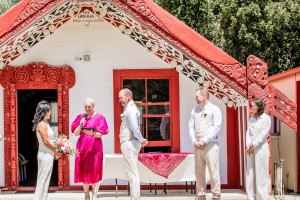
As celebrants, we’re often asked by our couples to incorporate Te Reo Māori into their wedding ceremonies - and we love this! It’s such a privilege to honour and celebrate our Māori culture and heritage on such a special day.
I was fortunate enough to officiate my brother’s wedding to his greatest love at her family marae in Poroporo, Whakatane - Rewatu Marae. It gives me great pleasure to share with you what I learnt during this beautiful celebration (and many other ceremonies where our Māori culture has been included).
Whether you have Māori roots or simply wish to pay tribute to Aotearoa's rich cultural tapestry, integrating the Māori language and customs into your wedding can add profound meaning and authenticity to your special day.
Understand the Importance of Te Reo Māori
Te Reo Māori, the Māori language, is a vital part of New Zealand’s cultural identity and heritage. It carries deep cultural significance and is integral to Māori traditions and customs. Understanding the language’s importance and the cultural context can help you make informed and respectful choices when incorporating it into your ceremony.
Consult with Māori Experts
If you’re unfamiliar with Te Reo Māori or Māori customs, it’s advisable to consult with Māori experts, such as cultural advisors, kaumātua (elders), or local iwi (tribes). They can provide guidance on the correct usage of the language and ensure that your incorporation of Māori elements is culturally appropriate.
Start with a Pōwhiri
Begin your ceremony with a pōwhiri, a traditional Māori welcome ceremony. This involves a formal greeting and acknowledgement of the occasion, setting a respectful tone for the day. A kaumātua (elder) or a representative from your whānau can lead this part, offering a warm and culturally significant welcome to your guests.
Include a Traditional Māori Welcome Song
A traditional Māori welcome song, or “karanga”, can open your ceremony. This call-and-response chant traditionally welcomes guests onto a marae (meeting place) but can be adapted for weddings. The song can be performed by a soloist or group, and it adds a ceremonial and heartfelt element to your celebration.
Embrace the Māori Concept of Whakapapa
Whakapapa, or genealogy, is a fundamental Māori concept that connects individuals to their ancestors and heritage. Consider including a segment in your ceremony where you acknowledge your own whakapapa or that of your partner. This can be done through a brief narrative or a symbolic gesture, like planting a native tree together to represent the growth of your new family tree.
Incorporate Māori Language into Your Vows
Including Te Reo Māori in your wedding vows can be a meaningful way to express your commitment. You might include traditional Māori phrases or incorporate a Māori proverb that resonates with your relationship. For example: “Aroha mai, aroha atu” – Love received is love returned.
A cultural advisor or translator can assist you in crafting vows that honour Māori language and traditions.
Choose Māori Greetings and Farewells
Start your ceremony with a traditional Māori greeting and end it with a farewell. Common greetings include :“Tēnā koutou katoa” – Greetings to you all.
For a farewell, you might use: “Ngā mihi nui” – Sincere regards.
These greetings can be woven into the ceremony to set a respectful and inclusive tone.
Include Māori Blessings and Prayers
Incorporating a Māori blessing or prayer can add a spiritual dimension to your ceremony. Traditional Māori blessings, known as “karakia”, are often used to seek guidance and protection. A well-known karakia includes: “Whakataka te hau ki te uru, / Whakataka te hau ki te tonga, / Kia mākinakina ki uta, / Kia mākūkū ki tai, / E hī ake ana te atākura / He tio, he huka, he hau hū.” (“Cease the winds from the west, / Cease the winds from the south, / Let the breeze blow over the land, / Let the mist be gone from the sea, / Let the red-tipped dawn come with a sharpened air, / A touch of frost, a promise of a new day.”)
Use Māori Music and Songs
Māori music and songs can enhance the atmosphere of your wedding. Consider incorporating traditional Māori songs, or “waiata”, into your ceremony. Be sure to choose pieces that are meaningful and appropriate for the occasion.
Include Māori Symbols and Traditions
Incorporate Māori symbols and traditions into your ceremony to reflect the culture. For example:
- The*“Korowai” (cloak): A ceremonial cloak that represents protection and respect. You might choose to wear or display a korowai as a symbol of honour.
- The “Waiata” (song): Integrate a traditional Māori song or hymn into your ceremony to celebrate the union.
- The “Harakeke” (flax): Often used in Māori weaving, it symbolises the weaving together of two lives.
Acknowledge Māori Culture and History
During your ceremony, take a moment to acknowledge the significance of Māori culture and history. You might include a brief introduction about why you’re incorporating Te Reo Māori and what it means to you. This acknowledgment can demonstrate respect and deepen the cultural impact of your ceremony.
